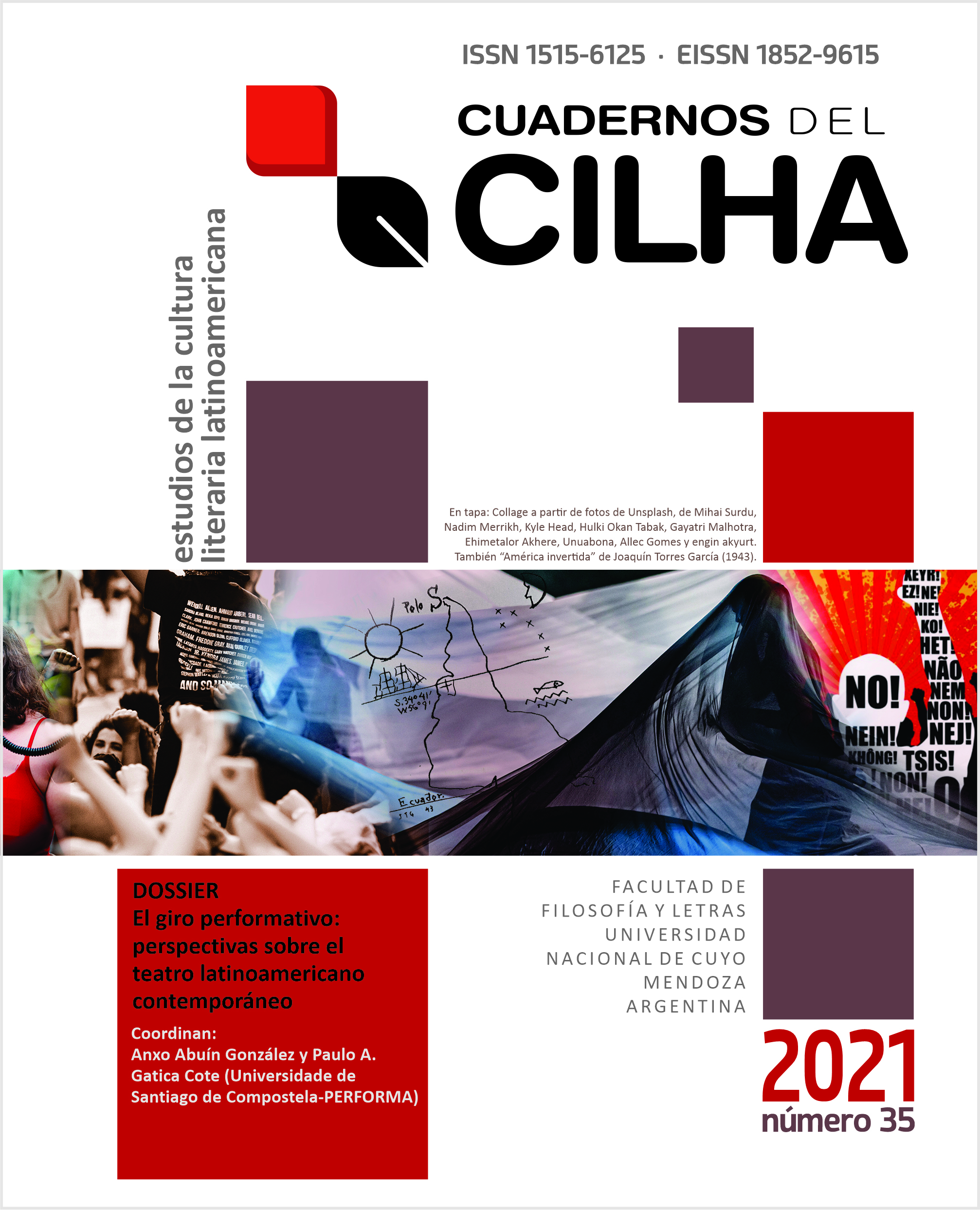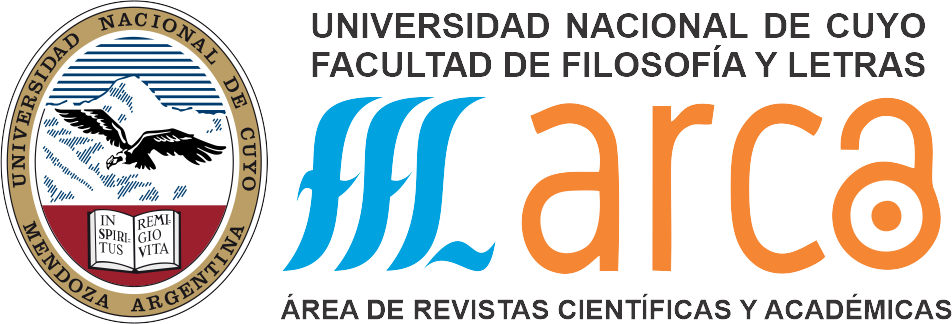(Pos)dictatorship: anti-establishment and dissenting strategies in the dramaturgy of Susana Torres Molina
DOI:
https://doi.org/10.48162/rev.34.032Keywords:
(Post)dictatorship, Theater, Violence, Trauma, TestimonyAbstract
Considering the political nature of theater and the performative action in the theatrical space, this essay analyzes Argentinian dramatist Susana Torres Molina's trilogy Esa extraña forma de pasión (2013), La fundación (2019), and Un domingo en familia. The objective of this analysis is to observe the textual and performative practice of theater as a space for creation, negotiation, and encounter to display the effects of systematized violence against social and marginalized sectors of political opposition, taking into account a neoliberal culture, as well as necropolitical and religious models. Although it has been almost forty years since the return of democracy in Argentina, the social trauma, beyond being identified by the event that caused it, persists in the structure of its experience, reception, consumption, and progressive repetition in the present. In the last decade, Torres Molina has reconstructed and redefined the Argentine dictatorial past through her theater, which invites us to reflect on the relevance of the painful but necessary retroactive looks and their effects in the XXI century.
References
Abuelas de Plaza de Mayo (2019, 13 de junio). Casos resueltos. Consultado el 15 de febrero de 2021. https://www.abuelas.org.ar/caso/buscar?tipo=3
Agamben, G. (1998). Homo Sacer. El poder soberano y la nuda vida. [Traducción de D. Heller-Roazen]. Stanford University Press. [Originalmente publicado en 1995].
Alonso de Santos, J. L. (1998). La escritura dramática. Castalia.
Arendt, H. (1974). Los orígenes del totalitarismo. [Traducción de G. Solana]. Taurus. [Originalmente publicado en 1951].
Arendt, H. (1993). La condición humana. (Traducción de R. G. Novales). Paidós. (Originalmente publicado en 1958).
Arendt, H. (2005). Sobre la violencia. [Traducción de G. Solana]. Alianza Editorial. [Originalmente publicado en 1969]
Barthes, R. (2003). Ensayos Críticos. [Traducción de C. Pujol]. Seix Barral.
Bennett, B. (2005). All theater is revolutionary theater. Cornell University Press.
Butler, J. (2015). Notes Toward a Performative Theory of Assembly. Harvard University Press.
Catena, A. (2020, junio). Entrevista con la dramaturga y directora Susana Torres Molina. Revista Cabal. https://www.revistacabal.coop/entrevistas/entrevista-con-la-dramaturga-y-directora-susana-torres-molina
Dubatti, J. (2006). Teatro y producción de sentido político en la postdictadura. Centro Cultural de la Cooperación.
Dubatti, J. (2018). The liminal as constitutive of the theatrical event and the concepts of teatro-matriz and liminal theatre. En J. A.
Noriega y A. Santana (eds.), Theatre and cartographies of power (pp. 35-45). Southern Illinois University Press.
Fortier, M. (2002). Theory/theater. Routledge.
Foucault, M. (1977). Counter-memory: The philosophy of difference. [Traducción de D. F. Bouchard & S. Simon). En D. F. Bouchard (ed.), Language, counter-memory, practice (pp. 113-196). Cornell University Press.
Franco, J. (2013). Cruel modernity. Duke University Press.
Gladhart, A. (2000). The Leper in Blue. The University of North Carolina Press.
Hubner, Z. (1988). Theater and politics. Northwestern University Press.
Ilie, P. (1980). Literature and inner exile. The Johns Hopkins University Press.
Mbembe, A. (2003). Necropolitics [Traducción de L. Meintjes]. Duke University Press.
Nora, P. (1989). Between memory and history: Les lieux de mémoire [Traducción de M. Roudebush). Representations, 26, 7–24. https://doi.org/10.2307/2928520
Osorio, E. (1998). A veinte años luz. Editorial Alba.
Partnoy, A. (2006). La Escuelita: Relatos testimoniales. La Bohemia. [Originalmente publicado en 1958]
Pavlovsky, E. (1980). El Señor Galíndez. Editorial Fundamentos.
Procuraduría de crímenes contra la humanidad. (2020, diciembre). Informe estadístico sobre el estado de las causas por delitos de lesa humanidad en Argentina. Ministerio público fiscal. https://www.fiscales.gob.ar/wp-content/uploads/2020/12/Lesa_-informe-diciembre-1-2020.pdf
Puenzo, L. (Director). (1985). La historia oficial [película]. Cohen Film Collection.
Ros, A. (2012). The post-dictatorship generation in Argentina, Chile, and Uruguay: Collective memory and cultural production. Palgrave.
Said, E. (2000). Reflections on exile and other essays. Harvard University Press.
Scarry, E. (1985). The Body in Pain. Oxford.
Taylor, D. (2012). Acciones de memoria: Performance, historia y trauma. Fondo Editorial de la Asamblea Nacional de Rectores.
Taylor, D. (2016). Performance. Duke University Press.
Torres Molina, S. (2013). Esa extraña forma de pasión. En M. S. Farnsworth, C. Stevens y B. Werth (eds.), Escrito por mujeres II (1951-2010). (págs. 95-134). University of Kansas Press.
Torres Molina, S. (2019). La fundación. Centro Latinoamericano de Creación e Investigación Teatral.
Trancón, S. (2006). Teoría del teatro. Fundamentos.
Villegas, J. (2011). Historia del teatro y las teatralidades en América Latina. Editorial Gestos.
Published
How to Cite
Issue
Section
License
Copyright (c) 2021 Osvaldo Sandoval-Leon

This work is licensed under a Creative Commons Attribution-NonCommercial 4.0 International License.





















